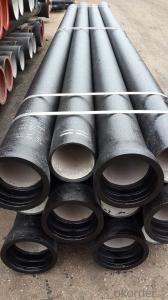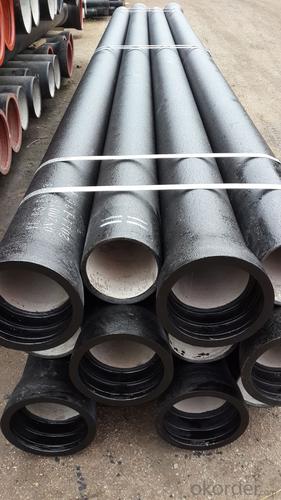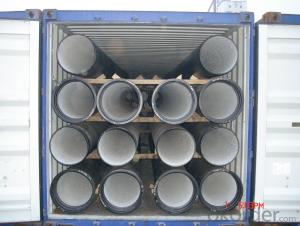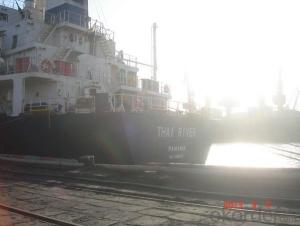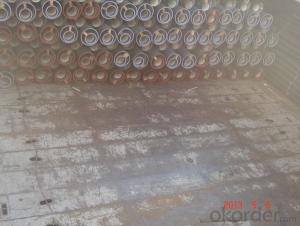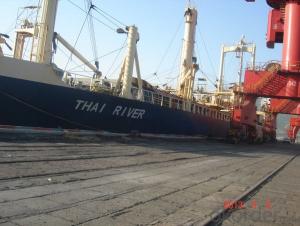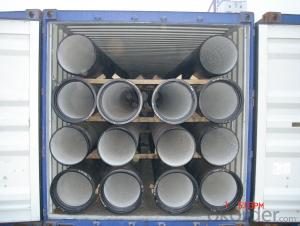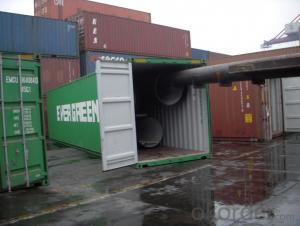DUCTILE IRON PIPES AND PIPE FITTINGS C CLASS DN700
- Loading Port:
- Tianjin
- Payment Terms:
- TT OR LC
- Min Order Qty:
- 22 m.t
- Supply Capability:
- 30000 m.t/month
OKorder Service Pledge
OKorder Financial Service
You Might Also Like
Material : Ductile Cast Iron
Size Range : DN 80mm to DN 2000mm
Unit Effective Length : 6m or 5.7m
Manufacture Standard: ISO 2531:1998/ EN 545:2006/EN 598:2007
Annual capacity : 200,000 tons
Coating Exterior: Zinc 130g/m2 according to ISO 8179-1 and bitumen coating 70 microns.
Cement Interior: Portland Cement/ High Alumina Cement/ Sulphate Resisting Cement Lining according to ISO 4179
Special requirements on external coating and internal lining can be applied
We also provide accessories such as SBR/EPDM rubber gaskets, lubricant paste, pipe caps, PE sleeves, etc.
Additional Parts:
Each pipe is strictly inspected according to related standard to ensure permanently high performance.
Easy Installation at site and service free for life
Long Service Lifespan
Quotation will arrive you within 24hours once we get your inquiry.
We guarantee offering you a competitive price.
A copy of original inspection reports of pipes will be offered after shipment.
Photos of loading process will be sent to the customer after shipment effect.
We will follow-up the delivery progress after shipment effect and update to the customer on weekly basis.
- Q: What are the lubricants for the installation of ductile iron pipes for tap water?
- When choosing lubricant, it is necessary to consider the movement of friction pairs, materials, surface roughness, working environment and working conditions, as well as the performance of lubricants. In mechanical equipment, lubricants are mostly distributed by lubrication to the parts that need lubrication.
- Q: Can ductile iron pipes be used in potable water systems?
- Yes, ductile iron pipes can be used in potable water systems. Ductile iron is a suitable material for water distribution systems as it has excellent durability, strength, and corrosion resistance. It is commonly used in potable water systems due to its ability to withstand high water pressure and its long service life. Additionally, ductile iron pipes are also approved by various national and international standards for use in potable water applications.
- Q: What is the expected leakage rate for ductile iron pipes?
- The expected leakage rate for ductile iron pipes can differ depending on various factors like the pipes' age, condition, and installation approaches, as well as the quality of materials employed. Nevertheless, ductile iron pipes generally have a reputation for being durable and having low leakage rates compared to other pipe materials. Based on industry standards and research studies, well-maintained ductile iron pipes are expected to have a leakage rate as low as 0.1% per year. This implies that, on average, less than 1 liter of water may leak per meter of pipe length annually. However, it is important to note that this is an average value and actual leakage rates can vary. Regular maintenance and inspections are crucial in minimizing leaks and ensuring the longevity of ductile iron pipes. Additionally, proper installation techniques, such as using effective jointing methods and appropriate bedding and backfill materials, can also contribute to reducing leakage rates. To determine the expected leakage rate for specific ductile iron pipe installations, it is recommended to consult industry professionals and adhere to applicable standards and regulations.
- Q: How are ductile iron pipes installed?
- Typically, the installation of ductile iron pipes follows a specific process. Firstly, the required depth and width of the trench are excavated. Careful leveling and compaction of the trench's bottom then establish a stable foundation. Next, a bedding material, usually a mixture of sand and gravel, is placed at the trench's bottom. This material supports the pipe and distributes the load evenly, while also safeguarding it from any sharp objects in the soil. Once the bedding is prepared, the ductile iron pipes are gently lowered into the trench and aligned as desired. Proper alignment and the correct slope are essential for efficient water flow. Subsequently, the pipes are joined together using either a mechanical joint or a push-on joint system. These joints are designed to create a secure, leak-free connection between the pipes. Rubber gaskets are typically used to seal the joints and establish a watertight seal. After joining the pipes, the trench is backfilled with the excavated soil. Care is taken to compact the soil in layers to prevent settlement. The backfilling process is typically carried out in stages to ensure proper compaction. Lastly, the installation is completed by connecting the ductile iron pipes to the existing water supply system or other pipes using appropriate fittings and valves. Pressure testing may also be conducted to verify the installation's integrity. In conclusion, the installation of ductile iron pipes necessitates meticulous planning, precise alignment, and secure jointing to establish a durable and dependable water supply system.
- Q: Are ductile iron pipes suitable for desalination plants?
- Ductile iron pipes are the perfect fit for desalination plants. These plants typically need to move large amounts of water, and using ductile iron pipes has numerous advantages that make them an ideal choice for this purpose. To begin with, ductile iron pipes possess exceptional strength and durability, which are crucial for withstanding the high pressure and corrosive nature of desalinated water. They can easily handle the rapid flow rates and maintain their structural integrity over long distances, ensuring a dependable and efficient water transportation system. Furthermore, ductile iron pipes exhibit excellent resistance to corrosion, a key factor in desalination plants where the water often contains high levels of salt and other minerals. The corrosion-resistant properties of ductile iron pipes ensure that the water quality remains uncompromised and that the pipes have a long service life, ultimately reducing the costs associated with maintenance and replacement. Moreover, ductile iron pipes have a remarkable ability to withstand impacts, making them particularly valuable in desalination plants where pipelines may be exposed to external forces or accidental damage. By being able to endure such impacts, the risk of leaks is significantly reduced, ensuring a steady and uninterrupted supply of water. Additionally, compared to materials like stainless steel or PVC, ductile iron pipes are more cost-effective. They come with a lower initial cost and require less maintenance, making them the more economical choice for desalination plants. In conclusion, ductile iron pipes are undoubtedly the perfect fit for desalination plants due to their strength, durability, resistance to corrosion and impacts, as well as their cost-effectiveness. These pipes are well-equipped to meet the demanding requirements of desalination plants, providing a reliable and efficient water transportation system.
- Q: DN300 how long is it for water polo and iron pipes?
- Blue interface cast iron pipe, blue fixed inner cushion rubber, blue gasket seal; rigid joint like cast iron pipe mouth, compared with straight pipe inserted cement sealing process, has been basically eliminated
- Q: What is the expected surge pressure rating of ductile iron pipes?
- The surge pressure rating for ductile iron pipes can vary based on several factors, including pipe diameter, thickness, joint type, and manufacturer specifications. Generally, ductile iron pipes are built to withstand surge pressures ranging from 150% to 200% of their working pressure rating. For instance, if a ductile iron pipe has a working pressure rating of 250 psi, it can typically handle surge pressures of 375 psi to 500 psi. To obtain accurate surge pressure ratings for the specific ductile iron pipes being used, it is crucial to refer to the manufacturer's specifications and guidelines.
- Q: How do ductile iron pipes perform in high-velocity water flow conditions?
- Ductile iron pipes perform excellently in high-velocity water flow conditions. Their inherent strength and durability allow them to withstand the force and turbulence of fast-flowing water without any significant issues. These pipes have been extensively tested and proven to maintain structural integrity, resist erosion, and minimize the risk of leaks or bursts, making them a reliable choice for high-velocity water flow applications.
- Q: Are ductile iron pipes suitable for installation in areas with high groundwater contamination and soil erosion?
- Yes, ductile iron pipes are suitable for installation in areas with high groundwater contamination and soil erosion. Ductile iron pipes are known for their durability and resistance to corrosion, making them highly suitable for such conditions. Additionally, their ability to withstand external pressure and soil movement makes them a reliable choice in areas prone to soil erosion.
- Q: Do ductile iron pipes have inner enamel?
- For fire water and living water supply, low requirement is lined with cement mortar, some high can be lined with epoxy resin, epoxy ceramic lining, as well as cement mortar lining epoxy sealing layer (compromise is the price of blame).
Send your message to us
DUCTILE IRON PIPES AND PIPE FITTINGS C CLASS DN700
- Loading Port:
- Tianjin
- Payment Terms:
- TT OR LC
- Min Order Qty:
- 22 m.t
- Supply Capability:
- 30000 m.t/month
OKorder Service Pledge
OKorder Financial Service
Similar products
Hot products
Hot Searches
Related keywords
